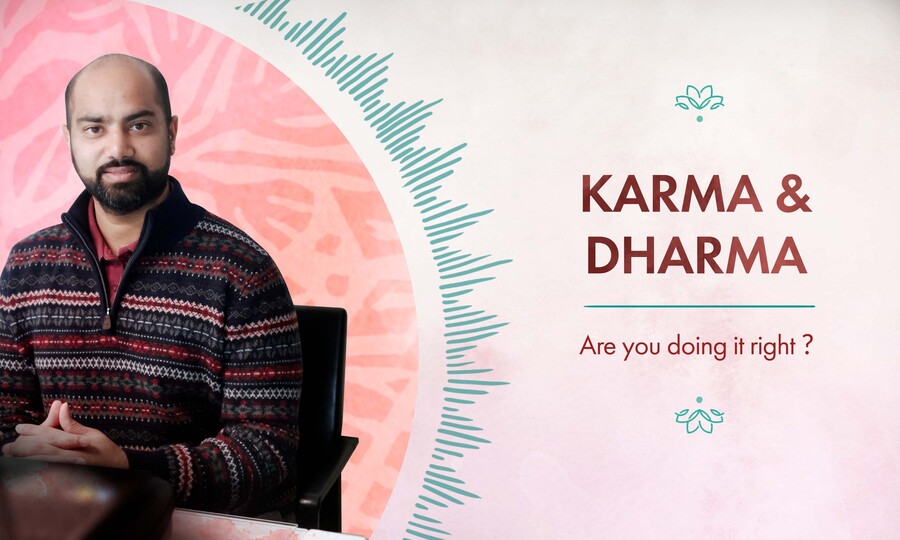"It is better to perform one’s prescribed duties, even if it has some faults in it, rather than performing someone else’s duty perfectly.” - Bhagavad Gita (chapter 3, verse 35)
‘What goes around, comes around’ is a saying that many people compare to the notion of karma. What does karma really mean in Indian philosophy? Did you know there are different types of karma? After reading this blog, you will understand the difference between the types of karma, what Karma Yoga means according to the Bhagavad Gita and how this is relevant in our life.
What is Karma?
Karma can literally be translated as 'action'. It refers to the metaphysical law that every action has an equal reaction. This reaction can either take place immediately or at some point in the future. Indian philosophy is characterized by the notion of infinity, implying reincarnation and rebirth. Therefore these karmic reactions operate across lifetimes. Good or virtuous actions will have good reactions and bad or vicious actions will have the opposite effect.
Different types of Karma
Karma is determined by the accumulation of virtuous and vicious actions, which form a chain of cause and effect.
Swami Sivananda explained that this chain has no end. You can think of a tree and its seeds: A seed is a cause for the tree growing, which is the effect. The tree produces seeds and thereby becomes the cause in turn. The cause is found in the effect and the effect is found in the cause. It is infinite.
In this infinite chain, three kinds of karma can be distinguished: past karma (Sanchit Karma), present karma (Prarabdha Karma) and future karma (Agami Karma).
- Past karma consists of all the accumulated karma from the past. It can be recognized in the character of a person, his tendencies and aptitudes, capacities and desires. You can think of past karma affecting the person right at birth, taking the karma of past lives into the new life cycle.
- Present karma is what is happening during the current life cycle. It cannot be avoided or changed; actions from the past require an equal and opposite reaction at this point in the chain.
- Future karma is the effect of present actions on the ongoing chain of reactions. This part of karma is can be changed or influenced by the choices you make. Again, whether these choices are virtuous or vicious are dependent on dharma.
Morality in the Bhagavad Gita
The Bhagavad Gita is a foundational text in Indian philosophy, describing the battle of the warrior Arjuna and his family with the help of the Hindu god Krishna. Arjuna is asking Krishna about why he should fight in the battle, why he should fight against his brothers and uncles. The entire discourse of the Bhagavad Gita, in which Shri Krishna explains Arjuna why he must fight, is essentially about what is right and wrong in terms of karmic duty, or dharma.
Krishna guides him through the battle, demonstrating that fighting is the right action because Arjuna’s duty as a warrior is to fight for the good of a larger society. He should act based upon his dharma, instead of being led by his emotional bonds to family. The acts of each person in the same situation can be different, depending on their dharma. Not acting according to one's own dharma is wrong and called adharma.
So, what is defined as good or bad karma depends on your ‘dharma’.

Discover yoga philosophy principles to boost your happiness
Get free access to a life-changing series of 6 webinars with Arhanta Yoga founder Ram Jain
The Principles of Dharma
Dharma can be described as 'duty' or 'morality'. You can think of dharma as the power that maintains order and righteousness in society. What is right or wrong, good or bad, is not the same for every person.
For each person, their dharma is dependent on four principles:
- Rita-dharma is connected to the larger forces of nature and the universe. Each period in time and space has its own effect on a larger scale.
- Varna-dharma encompasses duties at the level of society and community. Each person has specific responsibilities at this level.
- Ashrama-dharma refers to the changes in duties across the lifespan. What is appropriate to do varies by age.
- Sva-dharma operates on the smallest scale, the inner world of the individual. Sva-dharma is about actions and intentions in the ego and the mind.
All these four different principles of morality are connected to a person’s karma. The tasks you should fulfill are dependent on past actions, requiring a balancing effect in this life.
Thus, different people have different obligations and duties, determined by factors such as their age, the period in time, their social position, and their actions in the past. Everyone has their individual dharma, determining what actions are right or wrong according to their duty.
Our choices and duties in life
As you can see, karma does not only entail what happens to you, as popularly believed. It operates on a more subtle level by determining the choices and duties you have in a particular situation. Good past karma creates a larger range of possibilities to choose from than bad past karma. Present karma determines the moment to make these choices. Future karma is affected by the choices you make.
The idea that you have options to choose from, implies that you are in charge of your actions and how they affect your karma. It makes you responsible and also empowers you to change in a positive direction. You are responsible for your own well-being and suffering, for your own present and future state. If you make the right choices, it bears a fruit sooner or later.
What is the right choice that can sometimes be hard to discriminate? The principle of attachment can be helpful here. Attachment comes from the ego, encompassing the things that you like or dislike. Although you may like to do your duties, you do not act accordingly because you like it.
An example of this can be a commitment to a volunteer job. You put an effort into doing your job well, even though you might not like all the tasks. But in the end, you dedicate your time and energy to something bigger than yourself. This is why karma yoga is sometimes referred to as ‘selfless service’; duties that help you to become free of the ego.
Liberation from the endless cycle
Karma operates across lifetimes. It results in an endless cycle of birth and rebirth, with the consequences of actions in past lives coming back in the present. These past live consequences are called samsara.
According to yogic philosophy, you can be liberated from this cycle. Liberation or moksha actually is the ultimate goal of yoga. Through the practice of yoga, specifically the Yamas & Niyamas (moral codes & observances), as well as meditation you can balance your karmic account and become free of the circle of life and death.
You cannot choose the karma that you are carrying with you from previous lifetimes or from earlier in this life. But you can choose your actions in the present and the future.
Conclusion
In conclusion, karma refers to an endless chain of actions and reactions. What actions are right are wrong depends on your dharma, your duties in life. Your duties, as well as your choices, are determined by past karma, and they inevitably come back in the present.
But you can influence your future karma by making virtuous choices now! Virtuous choices are those that help you do your duties at your best, without the involvement of your ego or attachment. When all karma is balanced, liberation takes place; you are free from the cycle of birth and rebirth.
This is a repost. For the original article please visit: https://blog.sivanaspirit.com/sp-gn-karma-dharma-doing-it-right/

Discover yoga philosophy principles to boost your happiness
Get free access to a life-changing series of 6 webinars with Arhanta Yoga founder Ram Jain

